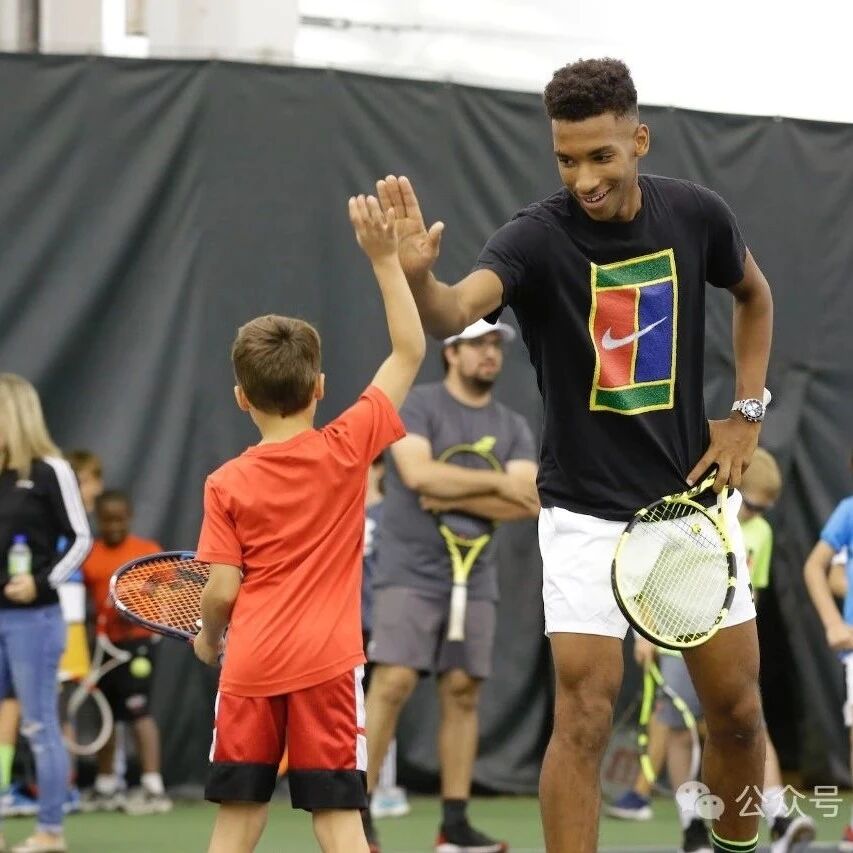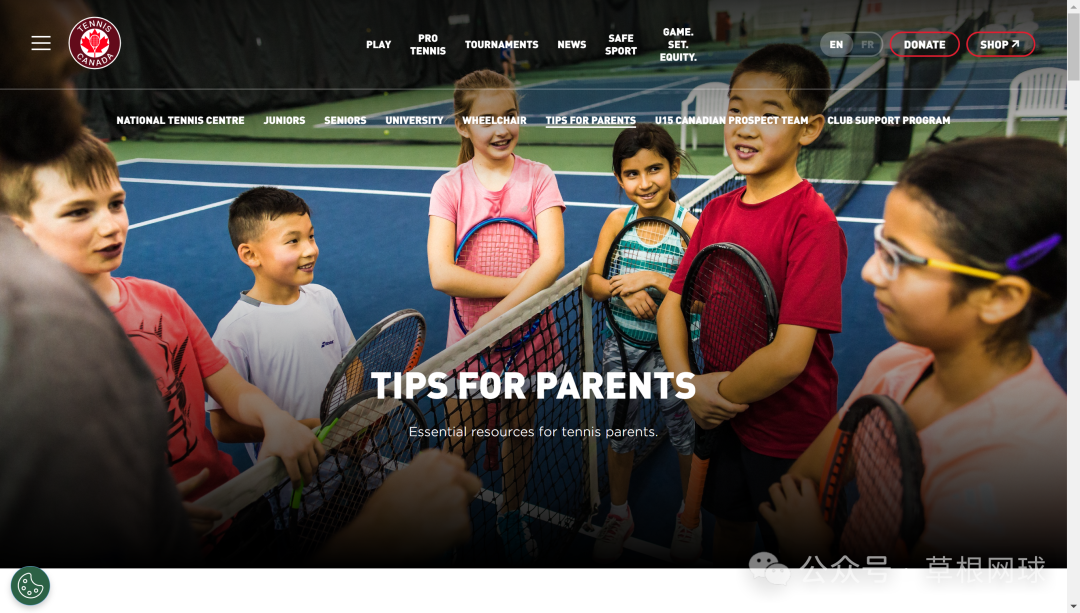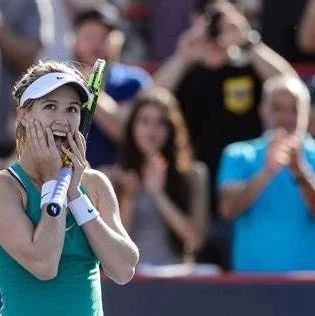How Parents Can Support Tennis Training (and Boost Players' Intrinsic Motivation)

"All articles in the 'Translating Trees into Forests' column are sourced from foreign-language translations and are not declared original. If any content infringes upon copyrights, please contact us for removal."
01
Written in advance
This translation comes from Tennis Canada's "Tips for Parents" column, which periodically offers parents practical, targeted advice on tennis training.

As an integral part of education, the ultimate goal of sports training is to "help people achieve their full potential."
A training team consists of athletes, coaches, and parents, and its core purpose is also to help athletes achieve their full potential.
However, under the current youth sports training model, parents often take the lead, inadvertently overlooking the goal of "helping children achieve their full potential," and frequently end up complaining that "their kids lack intrinsic motivation."
Some parents are unaware.Self-esteem and confidence are the sources of athletes' intrinsic motivation.It's deeply regrettable to think that relying solely on external motivation is enough to help children achieve competitive success.
Some parents, driven by short-term goals, view "verbal abuse, threats, bribery, or even physical violence" as a quick-fix solution—yet this approach is nothing more than drinking poison to quench their thirst. Such behaviors deeply erode their children’s self-esteem and confidence, ultimately leading to a loss of interest in the material being studied.
The best education is self-education, and the secret to consistently pursuing it lies deep within children's hearts.
Let's finish reading this article, and then carefully consider how we can help children enjoy the training process and achieve their full potential!
02
Training habits and lifestyle habits are closely intertwined.
If you want your children to grow into confident "winners"—individuals who fully embrace themselves and maintain a positive attitude toward sports—during their teenage years, make sure to recognize the important role you play!
For the sports training team, in addition to coaches and athletes,Parents are also a crucial component.
If parents can properly fulfill their responsibilities and play their part, children will master motor skills more quickly, perform better, experience greater enjoyment—and as a result, boost their self-esteem.
If children learn how to face challenges and overcome difficulties through their early athletic experiences, these positive attitudes can easily enhance every aspect of their lives.
If parents are "unsupportive" or even provide incorrect guidance, children may not only stop making progress in their athletic skills but also hit a plateau in improving their overall performance—ultimately leading them to lose interest in the sport altogether.
Even worse, instead of strengthening your parent-child bond by fostering an interest in sports, your misguided approach has severely strained the relationship.
After going through all of this, children may grow into individuals filled with feelings of failure, helplessness, and severely damaged self-esteem—emotions that can easily spill over into other areas of their lives.
03
Training follows the "Law of the Barrel."
In competitive sports, it’s unlikely for children to become true "winners" by relying solely on their coach’s guidance and self-study.
This article will share valuable insights, guiding principles, and strategies to help parents better understand youth sports competition.
In the training team, the combined efforts of athletes, coaches, and parents constantly shape the outcomes of the training process.
If even one of these three areas falls short, the final outcome will inevitably be unsatisfactory. So, parents, it’s time to take action.
04
Realizing that the opponent is actually a child's valuable training partner
When properly defined, competition is beneficial and healthy for youth sports.And it can teach children a variety of important life skills.
The word "competition" comes from the Latin roots "com," meaning "together," and "petere," meaning "to seek." Therefore,The true definition of competition is the joint pursuit,Children's opponents are actually their partners, not enemies!
The better the opponent performs, the greater the opportunity for the kids to deliver a breakthrough performance.
The essence of sports is to face challenges and difficulties.If a sport lacks a worthy opponent and faces no challenges, it quickly becomes incredibly boring.
The greater the challenges children face, the more opportunities they have to push beyond their own limits.
World records are constantly broken and rewritten at the Olympics because the world's top athletes are "working together"—pushing each other to new heights and challenging one another to elevate their athletic performance.
Don’t teach children to view their opponents as "bad people," enemies, or individuals who should be hated and "destroyed." Never encourage this kind of attitude!
On the contrary,You can talk to or even become friends with the opposing parent, cheering loudly for their child’s great plays and shots—not just focusing on winning the game!
05
Encourage children to unlock their full potential.
The ultimate goal of sports experience is to challenge yourself and continually improve.
Unfortunately, many parents judge their children's progress based on winning or losing, which is neither fair nor accurate.
The true sports winners are those who unleash their full potential, regardless of the match outcome or their opponent's performance.
You should encourage children to unlock their full potential. When your child adopts this mindset—focusing on improving themselves rather than competing to beat others—they’ll feel more relaxed, enjoy the process even more, and ultimately enhance their athletic performance.
06
Don't judge a hero by success or failure.
The purpose of involving youth in sports is to help children learn and master athletic skills.
If a child has given their all but still lost the match, criticizing them for the outcome at that moment would be unfair.
If your child played exceptionally well in a game but still ended up losing, you need to help them rebuild that winning mindset!
Similarly, when a child or team wins despite not performing at their usual level, it doesn’t mean they can confidently claim themselves as true victors.
Parents need to help their children understand the crucial distinction between success and failure, as well as between winning and losing.
Remember, if a training team defines success and failure solely by wins and losses, they’re more likely to end up losing.
07
Be a lifelong supporter, without getting involved in the training.
Unlike coaches, parents should act as unwavering supporters.
You need to unconditionally be your child’s most loyal fan, leaving the tasks of training and coaching entirely to the coach.
Provide encouragement, support, empathy, transportation, financial assistance, and more—but **please don’t try to steal the coach’s job.**
Most parents who encounter issues in their relationships with their children have simply forgotten the role they’re supposed to play.
Overly intensive involvement in training can interfere with parents' roles as supporters and fans.
When kids are in a bad mood or after losing a game, the last thing they want to hear is their parents endlessly pointing out the technical or strategic mistakes they just made.
Typically, you’ll need to separate your parental role from your "coach" role. If you find yourself briefly taking on the role of a coach, make an effort to keep the two roles clearly distinct.
(For example, on the playing field or court, you’d say: "I’m speaking to you now as your coach," while at home, you’d say: "I’m talking to you now as your parent.")
When you're coaching, don't act like a parent—but when it’s time to be the parent at home, don’t try to coach.
08
Help your child learn to enjoy the fun of sports.
There's a well-known fact in the sports world: the more fun athletes have, the more they learn—and the better their performance becomes.
Whether it's a sports event of any level, whether it involves young athletes or world-class competitors,Only by experiencing the joy of movement can you achieve peak performance.
When a child stops enjoying and starts fearing training or competition, that’s when you, as a parent, should start to worry.
When sports or competitions become too serious, athletes often feel overwhelmed and are prone to developing repetitive issues during their performance.
A simple rule of thumb: If your child no longer enjoys what they’re doing or has lost their passion for the sport, it’s time to take a closer look—what exactly is holding them back? Is it the coach? The pressure? Or maybe even yourself?
Remember,Participating in highly competitive sports doesn’t mean there’s no room for fun. Kids who continue despite no longer finding any enjoyment in it will ultimately end up quitting their athletic careers.
09
Whose goal is it, exactly? This sport belongs to your child!
The fifth point raises a crucial question: Why is your child participating in this sport—because they genuinely want to, or because of you?
When they encounter issues during their activities, do you collectively refer to these as "our" problems—like, "We’re not jumping high enough" or "There’s an issue with one of our techniques," and so on?
Are they participating in this activity because they don’t want to let you down—because they know how important it is to you? Or is it for the rewards and "bonuses" you’ve offered? Are their goals and aspirations yours, or their own? And how much do you actually influence their successes and failures?
If their participation in the competition is aimed at pleasing you or feeding your ego, then their motivation is entirely misguided!
Further speaking,If they’re only participating for your sake, everyone on the training team will ultimately end up as losers.
The desire to see your son become a dragon and your daughter turn into a phoenix is perfectly natural. But for it to actually come true,Absolutely not about imposing your expectations on your child, exploiting their guilt, or even bribing them to achieve what you want.
If they have enough intrinsic motivation, they’ll be even more driven to push beyond their limits—and ultimately achieve success.
10
"Your child's achievements" do not define "your child"—please love them unconditionally.
Don't equate a child's self-worth or their sense of being loved with their academic performance.
A tragic and damaging mistake parents often make is "punishing their children for not performing well enough, which ends up emotionally distancing them."
For example, when a child loses a match, gets bowled out, or misses an easy "giveaway" question, parents might respond with disgust or anger—sometimes even acting as if they no longer love or approve of their child.
(Note:This strategy could emotionally harm your child and damage your relationship with them.When Olympic diver Greg Louganis needed a perfect score on his final dive to edge out the Chinese competitor and claim the gold medal, his last thought before jumping was“Even if I don’t succeed, my mother will still love me.”)
11
In parent-child interactions, always remember the importance of your child's self-esteem.
Regardless of age or skill level, a player's athletic performance is directly linked to how they feel about themselves.
When your childWhen placed in an environment that boosts self-esteem, they learn more happily, enjoy competitions more, and perform better even under competitive pressure.
Everyone, from childhood to adulthood, longs to be loved and accepted—hoping their parents will feel proud of the things they do. That’s how self-esteem is built.
When interactions between parents and children make kids feel amazing about themselves, they also learn to treat themselves the same way.
ButIt doesn’t mean you have to unrealistically praise your child’s efforts just because they’ve performed poorly.
In this case, what's needed isEmpathize and learn to observe their emotions.
Self-esteem is what keeps the world turning. As parents, if you can help your children become confident, you’ll be giving them a gift that lasts a lifetime.Don't interact with children in ways that belittle, embarrass, or humiliate them—don't hurt their self-esteem.
If you constantly put your child down or dismiss their achievements, they’ll not only learn to belittle themselves in life—but they might even grow up to become parents just like you!
12
Teach children to embrace failure as a gift.
If you truly want children to be as happy and successful as possible in everything they do, thenTeach them how to cope with failure.
Whether in sports or other fields, there are two key differences between top-tier talent and the average person:
On the one hand,Top-tier talent is more willing to take risks, which is why they also experience failures more frequently. On the other hand, these high-caliber individuals know how to leverage their failure experiences—using them as both a source of motivation and a "mirror" to help them continuously improve and grow.
The general public tends to adopt a negative attitude toward challenges, as we’re taught that failure is inherently bad—it brings shame and embarrassment—leading us to avoid failure at all costs.
The fear of failure or shame can cause a person to hesitate and avoid taking initiative. In fact,Most sports performance issues are directly caused by players being overly concerned about failure or making mistakes.
Just as we need enough courage to face countless falls before we learn to walk—each time we stumble, our bodies instinctively know how to improve and do better next time.
If players worry too much about gains and losses or success and failure, they’ll never achieve success—or reach the pinnacle of their athletic careers.
If you teach children how to view setbacks, mistakes, and risks positively—and even embrace them—they’ll be handed the key to lifelong success.Failure is the perfect stepping stone to success.
13
Encourage children to embrace challenges, rather than resorting to threats.
Many parents directly or indirectly use guilt and threats as a way to "motivate" their children to perform better.
Studies show thatWhile threats may yield short-term results, in the long run, the damage to mental health and athletic performance is devastating.
Using fear as a motivational tool may be one of the worst associations you can create for your child.
Threats can cause children to lose enjoyment during sports, directly leading to poor athletic performance.
In fact, the threat actually reflects your own anxiety, since you don’t believe your child is capable.You always say, "You absolutely have to do it this way, otherwise..."
Even indirectly conveying this sense of distrust can further devastate the child’s athletic performance.
Failing a challenge doesn’t necessarily mean facing losses or negative consequences.
On the contrary,Embedded within the challenge is a powerful belief: "I believe you can do it."
14
Emphasize the process, not the outcome.
When athletes crumble under pressure and their performance falls far short of their true potential, it’s often because they’re overly focused on the outcome—whether it’s winning or losing—rather than on the process itself.
When athletes achieve peak performance, they’re fully immersed in the present moment of their actual performance—completely unconcerned with the outcome.
Result-oriented thinking often distracts athletes and makes them tense, leading to poor performance.
Additionally,When athletes become overly focused on outcomes entirely beyond their control, it can increase their anxiety levels, ultimately affecting their athletic performance.
If you genuinely want your child to succeed, help them shift their focus from the importance of the competition to the task at hand.
Truly supportive parents don’t emphasize “You have to win,” but instead focus more on learning skills and enjoying the game.
15
Don't make comparisons—respect the individual differences in personal development.
Supportive parents don’t compare their children to competitors when evaluating their progress.
Comparing children is a meaningless, inaccurate, and damaging behavior. Every child grows at their own pace, and making simplistic, blunt comparisons ignores the unique differences in individual development.
For example, the only thing two 12-year-old boys might have in common is their age! One could physically and athletically resemble a 16-year-old, while the other, who’s developing a bit later, might look and perform like a 9-year-old.
In the early stages of their athletic careers, comparing performance levels could lead talented but physically underdeveloped athletes to feel discouraged—and ultimately give up sports altogether.
The only value of comparison lies in teaching. If a child demonstrates the right technique, that child can even serve as a role model for comparison!
To help your child perform at their best, they need to learn how to stay focused on their own game—without letting concerns about other kids' performances distract them from doing so.
16
Teach children to develop an objective judgment about sports.
Under normal circumstances, the media tends to instill in the public the idea that sports competitions—whether about winning or losing—are more important than everyday life.
In fact,The match is just a game., and this is often overlooked by people.
Young athletes often lack objective judgment, a phenomenon that arises because young competitors frequently develop distorted perceptions of themselves and their performance after competitions.
Parents need to help their children set realistic expectations based on their own circumstances and existing abilities—while still allowing them to hold onto their dreams.
Whether you achieve a personal best or finish last, it’s worth celebrating—not feeling discouraged.
Likewise,Even if they lose the championship, the sun will still rise as usual.


